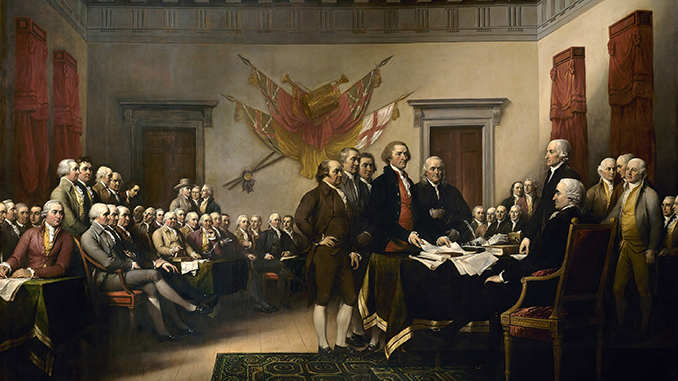
2019 marks the 243rd anniversary of United States having declared independence from Great Britain. The passage of time that separates the present moment from that epic event has widened into a chasm. As that gulf in time continues to grow, there is a danger that the bridge that connects the ideas that fueled the nation’s birth to the principles held by some future generation of Americans could rupture and then collapse into the mists of history.
The idea “that that all men are created equal, that they are endowed by their Creator with certain unalienable Rights, that among these are Life, Liberty and the pursuit of Happiness” led 56 courageous representatives from the 13 colonies to “mutually pledge to each other our Lives, our Fortunes and our sacred Honor” in pursuit of independence. Following independence, the infant nation experienced growing pains as a confederation of states. When that model proved deficient, those states’ representatives came together in 1787 and proceeded to draft a Constitution that sought to “secure the Blessings of Liberty to ourselves and our Posterity.”
The power of those extraordinary events reverberated across the early years of American history. Its effects could be found among the people throughout the expanding America that Alexis de Tocqueville visited in the early 1830s. Tocqueville marveled at what he found. He saw republican government functioning, freedom flourishing, and commercial prosperity rising.
Following his return to France, he published his seminal account of that visit, Democracy in America in 1835. Tocqueville highlighted the factors he believed sustained the nation’s unique political framework. He explained:
The chief circumstance which has favored the establishment and the maintenance of a democratic republic in the United States is the nature of the territory which the Americans inhabit. Their ancestors gave them the love of equality and of freedom, but God himself gave them the means of remaining equal and free, by placing them upon a boundless continent, which is open to their exertions.
The combination of freedom and opportunity was a potent one. As early as November 1839, The United States Magazine and Democratic Review published an essay that predicted that the United States was “destined” to become “the great nation of futurity.” That essay observed:
America is destined for better deeds. It is our unparalled glory that we have no reminiscences of battlefields, but in defense of humanity, of the oppressed of all nations, of the rights of conscience, the rights of personal enfranchisement… We point to the everlasting truth on the first page of our national declaration… The far-reaching, the boundless future will be the era of American greatness.
Just as that essay had foreseen, the United States grew, both in terms of territory and population. Once it reached the limits of its territory, its influence and impact on history continued to grow through the power of its ideas and example. The United States waged and won a bloody civil war, ended slavery, expanded the franchise of voting to women, secured victories in World Wars I and II, advanced civil rights, persisted through a Cold War that ended on the side of the world’s free peoples, put men on the Moon and sent spacecraft to the farthest reaches of the Solar System and beyond, and constructed a liberal world order anchored in the principles that echoed its own birth as a sovereign nation.
Those events comprised a “great expansion” of the United States as a force for human liberty and prosperity. Its exertions, sacrifices, and achievements made it possible for hundreds of millions of people all across the world to build better lives for themselves and their families. But if the nation’s people of today or tomorrow lose touch with the ideas that sparked the nation’s birth, the energy that has made the United States among the world’s most powerful forces for human good will wane then dissipate.
Already, a not insignificant slice of the nation’s people has succumbed to the siren song of nativism, isolationism, and populism. That segment has lost understanding of what it means to be an American. Under the influence of their alien principles, the United States has turned inward. It is retreating from the world stage. It is questioning the benefits of trade. It sees its allies as burdens. It is skeptical about science. It is cynical about truth. Its collective heart is hardening. On account of its ongoing evolution, global stability, economic prosperity, and human liberty are becoming more fragile.
Therefore, the great cause of this day is for the nation’s people to renew their commitment to America’s Founding principles. As the 1839 essay prescribed, “We must [go] onward to the fulfillment of our mission–to the entire development of the principle of our organization–freedom of conscience, freedom of person, freedom of trade and business pursuits, universality of freedom and equality.”
July 4th is no mere anniversary. It is the annual call to Americans to bring to fruition the promise of a world in which all people can truly enjoy their “unalienable Rights.” Today, that appeal is more urgent than it has been in many years.
